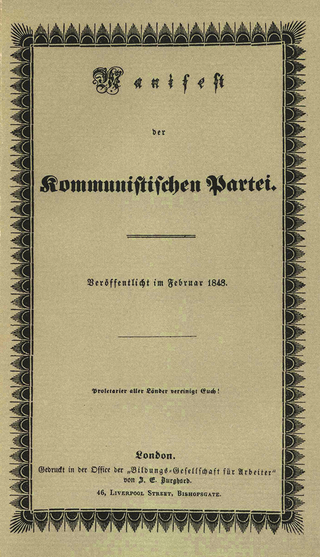Loading AI tools
社會主義(英語:socialism)是一種政治、社會、經濟哲學,包括各種以社會共有生產資料為特點的經濟與社會體系。[1][2][3][4][5][6][7][8][9][10]其中,社會共有生產資料可以透過國家擁有、集體擁有、工人自治、勞工合作甚至公民持股達成。雖然社會主義種類千千萬萬,沒有一種定義可以概括,[11]但是每一種都認為應該由社會控制生產資料。[5][12][13]
此條目論述以部分區域為主,未必有普世通用的觀點。 |
此條目可參照英語維基百科相應條目來擴充。 |
社會主義按是否擁有市場可分為兩種。[14]不帶市場的社會主義將要素市場和金錢剔除,資本主義下的價值規律也不復存在,它往往主張政府對經濟的計劃。這類社會主義追求避免資本積累、追求利潤造成的浪費、不公平和金融危機。[23]相反,所謂市場社會主義強調在社會擁有的企業和資本分配中保留金錢、要素市場甚至利潤動機的作用。這些企業的利潤可以選擇直接由雇員控制,或者選擇以社會紅利的形式發給全社會,以提升社會福利以及促進公共事業的發展。[24][25][26]社會主義計算爭論討論了社會主義內的資源分配方法和可行性——例如有社會主義者認為,資源分配[27]應該基於一個通用的體力勞動指標或者是直接基於勞動時間[28]。作為一項政治運動,社會主義的政治哲學主張從改良主義到革命社會主義均有分布。如國家社會主義主張推動生產、分配和交換全方位的國有化來實現社會主義;自由意志社會主義倡導工人傳統地控制生產方式,反對國家權力來進行管理;民主社會主義則透過民主化進程來謀求建立社會主義。現代社會主義理論始於19世紀知識分子與工人階級發起的批判工業化與私有財產的政治運動。早期的空想社會主義者,比如羅伯特·歐文曾試圖建立一個自給自足並脫離資本主義社會的公社;而聖西門則創造了名詞socialisme,提倡技術官僚與計劃工業的應用。[29]馬克思和恩格斯共同設計創造了一個除去導致不合格與周期性生產過剩的無政府狀態和資本主義生產的理想的社會制度[30][31]。一個地區,誰擁有所有貨幣的百分之幾,就相當於能擁有所有物質的百分之幾。這也是通貨膨脹與緊縮的原因。誰惡意抬高物價多賺百分之幾,這就是資本主義剝削原理。馬克思等人的初衷就是要消滅這種不公平的剝削制度。以上所述的資本主義剝削方式讓資本家不勞而獲地積累大量不應得的財富,也導致資本主義國家富者越富,窮者越窮。貧富差距越來越大。這種資本主義剝削制度只對少數資本家有益,而對大部分民眾無益,但資本主義國家當局支持這種制度,這就形成了資產階級專政。其執政的政黨也就成為了資產階級政黨,這是其階級性質。
詞源
「社會主義」一詞的詞根源自拉丁語sociare(社會),意指聯合或共享。羅馬和後來的中世紀法律中與之相關的較為專業的術語是societas。這個詞既有同伴關係和友誼關係的意味,也意指自由人之間基於一致同意而訂立契約的一種法律觀念。古希臘的哲學家亞里斯多德說人天生就是城邦制動物。在此基礎上,由自由的獨立個體的人之間組成的社會,其成員應該擁有公平,平等地位,「社會」(social)一詞有着兩種清楚分明的含義,這兩種含義都暗含了「社會主義」一詞較為晚近的用法。「社會」既可以指自由的公民之間的一種較為正式的法律上的契約關係,也可以指同伴和夥伴之間的一種情感關係。[32]
起源
關於社會主義的起源存在爭議,但是與保守主義和自由主義比較則簡單得多。關於社會主義的起源存在以下兩種說法。第一種說法包含着一定的背景,通常是從早期現代的各種觀念運動來探討社會主義論題;第二種說法主要認為社會主義思想起源於法國大革命時期。第一種說法中,有兩個人經常被提及,一個是托馬斯·莫爾爵士,因為他寫了一本書叫《烏托邦》;另一個是再浸理論者托馬斯·閔採爾。德國馬克思主義元老卡爾·考茨基的《托馬斯·莫爾和他的烏托邦》一書試圖證明這一說法。在此同一時期的另一個可追蹤的根據是英國內戰。在這樣的闡述中,像平等派和掘地派等團體常常獲得高度評價。例如,克里斯托弗·希爾對掘地派領袖溫斯坦萊的評價如下:
溫斯坦萊創立了一種19世紀和20世紀的社會主義和共產主義才會有的集體主義理論。溫斯坦萊抓住了現代政治思想中的主旨:國家權力和財產制度與支持這種制度的思想體系有關。他主張以對共同體的關注來取代競爭或革命。他也堅持認為,如果沒有經濟上的平等,將不可能會有政治的自由。從這個意義上說,他也算是一個現代人。
不過這種分析似乎存在問題,部分是因為當時並不存在着與19世紀和20世紀的社會主義相等同的信念。在社會主義觀念是否比「社會主義」一詞出現更早這一觀點上,人們可能會產生一定的爭議。然而,掘地派論者中的神學與文化的內涵顯然被忽略了。
第二種說法聚焦於法國大革命剛剛發生後的那段時期。一些學者對它與工業革命之間的相互作用也進行了一定的探索。利希海姆(Lichtheim)對18世紀90年代的評論是這樣的:「社會主義歷史一定起始於法國大革命,簡要地來說是因為法國是『空想社會主義』和『空想共產主義』的搖籃。而且這兩股思潮都產生於1789年到1799年的偉大革命期間。」大革命是一種嚴肅的考驗,「社會主義」一詞以及自覺堅定的支持這種意識形態的社會運動都經歷了大革命的考驗。所以這些現象在大革命時期和大革命之後都能找到它們的根源。企圖透過激進的社會和政治行動來擴展民主、權利、正義和平等的嘗試,儘管沒有帶來什麼善意的結果,但對全世界思想卻產生了很大的衝擊,這種衝擊一直延續到今天。法國大革命是自從1453年拜占庭帝國被奧斯曼土耳其滅亡後,歐洲各國發展各自經濟、政治、軍事時,社會主要矛盾的總爆發,古希臘式的民主政治揭示了,人、社會、國家、民主之間根本關係。人是社會關係的總和,國家的主體,人類終究會戰勝社會關係的束縛,充分體現人是自我的主宰。[33]
流派
空想社會主義最早見於16世紀托馬斯·莫爾的《烏托邦》一書,盛行於19世紀初期的西歐。
空想社會主義者認為社會主義的理想社會應該建築在人類的理性和正義的基礎上。這種社會至今還未出現,是由於人們不認識和承認的緣故。他們覺得只要有天才掌握了這種思想,並推廣開去,就能實現他們心中的理想社會。空想社會主義者反對資本主義,並認為資本主義的剝削制度是由於人類在道德和法律上犯了錯誤,背棄了人類的本性的緣故,他們的目的是要消滅這種錯誤。
所有空想社會主義者都批判資本主義制度,並確信資本主義應當為社會主義所代替。莫爾揭露了資本原始積累,痛斥了剝奪農民土地的圈地運動,指出這是羊吃人。聖西門把無政府狀態稱作「一切災難中最嚴重的災難」,認為經濟自由必然導致這一狀態。傅立葉認為雇傭勞動制度是「恢復奴隸制度」,資本主義工廠是「溫和的監獄」。歐文抨擊了資本主義私有制,認為私有制是一切階級之間紛爭的根源。他揭露了資本主義制度下的階級剝削關係,工人創造了巨量的社會財富,卻被工廠主、商人、銀行家、經紀人、收租者、食利者以及達官顯貴所瓜分。
大多數空想社會主義者都主張實行「財產公有制」,但各有見解。莫爾等把財產公有制理解為生產資料和消費品都公共佔有。摩萊裏、歐文等則理解為除日常生活品以外的財產的公共佔有,即是生產資料的公共佔有。少數空想社會主義者如聖西門、傅立葉在自己的理想社會中保存了生產資料私有制,這是資產階級傾向的明顯表現。一些空想社會主義者也提出了計劃經濟的思想。聖西門主張,在實業制度下要有計劃地組織生產,徹底根除無政府狀態。
16至18世紀的空想社會主義都帶有不同的禁慾主義色彩,有的甚至公開鼓吹戒絕一切享受的、苦修苦煉的斯巴達式的生活。到了19世紀初期,禁慾主義已經失去得以存在的條件,這時的空想社會主義者批判禁慾主義,對未來理想社會的高度物質和文化生活水準作了富有吸引力的宏偉想像。
從托馬斯·莫爾開始,許多空想社會主義者都注意到解決城鄉對立、腦力勞動和體力勞動對立的問題。羅伯特·歐文主張,把城市和鄉村結合起來,把工業和農業結合起來,把腦力勞動和體力勞動結合起來。
空想社會主義的發展經歷了3個階段:16世紀至17世紀、18世紀和19世紀初,共經歷了300多年。3個階段的社會和歷史條件各不相同,無產階級的發展水準也不同。
16世紀至17世紀,空想社會主義者提出了「實行公有制」、「人人勞動、按需分配」等社會主義基本原則,但對社會主義的設想還只是一個粗糙而簡單的輪廓。
18世紀,這時期的空想社會主義者開始對社會主義進入理論探討和論證階段,並用「法典」形式作出明確規定;對資本主義私有制進行了批判,認為私有制引起經濟上的不平等、進而導致政治上的不平等 ;當具備初步的階級觀點後 ,主張實行絕對平均主義的、斯巴達式的共產主義;在設計未來理想社會時,以農村公社和手工工廠為原型,主張在封建制度崩潰後,在農村公社和手工工廠的基礎上建立社會主義;贊同君主制、終身制、家長制等。
19世紀30和40年代,空想社會主義發展的頂峰時期。由於英國的工業革命在歐洲大陸迅速發展,資本主義制度的弊端日益暴露,這時期空想社會主義者對資本主義的社會制度、政治制度和道德觀念進行了批判;理論上,提出政治制度的基礎是經濟狀況,指出私有制產生階級和階級剝削;設計未來理想社會主義制度時以大工廠為原型,完全拋棄了平均主義和禁慾主義。

科學社會主義是馬克思、恩格斯的學術觀點,它從科學的角度認為,社會演變成私有制的階級社會,並不是人類犯錯而背離本性(空想社會主義),而是「社會勞動生產力,首先是科學的力量」(馬克思),發展到一定程度的結果。19世紀,社會主義在批判近代資本主義之基礎上產生[34]:3。人類社會因為生產力的不斷發展,最終都要走向「按勞索需、各盡其能」的科學社會主義的理想中去,馬克思主義認為資本主義制度在社會發展的歷史上起了一定的進步的作用,它推翻了相對陳舊的封建社會。社會主義是資本主義和共產主義之間的過渡階段,社會主義革命能夠成功和發生,也是因為資本主義社會為革命提供了必要的物質(生產力),社會主義需要有發達的資本主義作基礎才能實現。
馬克思和恩格斯認為,無產階級和資產階級不單有對立關係,還有繼承關係。在繼承關係中,無產階級必須要把資本主義社會所創造的全部生產關係和生產力繼承下來,如果不繼承這種高度社會化的生產關係,就不能從根本上消滅因為社會生產力不足而導致的貧富兩極化的私有制。
馬克思與恩格斯認為「歷史不外是各個世代的依次交替,每一代都利用以前各代遺留下來的材料、資金和生產力;由於這個緣故,每一代方面在完全改變了的條件下繼續從事先輩的活動,另一方面又經由完全改變了的活動來改變舊的條件。」
根據馬克思對社會發展的預言,人類社會的發展,在資本主義社會極大發展、生產力空前提高之後,工人階級(無產階級)藉由暴力革命獲得政權,從而實現生產資料的公有制。這樣的社會形態被稱為社會主義。(《共產黨宣言》)是馬克思的政治觀點,在君主獨裁時代藉由暴力獲得政權,是當時人類社會在社會發展中唯一的施政途徑,隨着社會生產力進一步發展,原有的生產關係、分配結構所造成的政權內部瓦解,相對於從外部施加暴力迅速有效。從最後實現物質生產極大豐富、產品按需分配的角度,符合生產力發展要求的生產關係、分配結構的國家才能最終進入共產主義社會。
而事實的歷史發展中,在蘇聯、中國等一些資本主義尚未獲得極大發展的發展中國家裡,自稱馬克思主義政黨的共產黨採用了恩格斯的暴力革命的政治觀點,發動無產階級(工人階級)、農民階級武裝暴動取得了國家政權。同時這些國家的共產黨未繼承資本主義的極大生產力的社會生產關係、生產資料、分配結構。反而根據這些國家原有的中央集權主義思想和傳統,建立了蘇聯模式的社會主義。在馬克思主義的基礎之上,衍生出了列寧主義、斯大林主義、托洛茨基主義、毛澤東思想、胡志明思想、鐵托主義、霍查主義、卡斯特羅主義、格瓦拉主義、歐洲共產主義等等。
- 建立歷史背景條件:馬克思預言的社會主義建立在資本主義極大發展、資本主義生產力空前提高的前提下;而蘇聯模式的社會主義建立在沙皇俄國的一戰戰敗,資本主義尚未充分發展,農奴經濟色彩依然濃烈的條件下。
- 政府組織模式:馬克思預言的社會主義建立在空前發達的資本主義基礎上,所以馬克思預言的社會主義繼承了資本主義原有的民主體制,馬克思的社會主義民主是比資本主義的民主更加民主的政權組織方式;而蘇聯模式的社會主義政權組織模式未發展資本主義原有的民主、政治、經濟、法制,其主要表現在中央政府高度集權。
- 國際背景:馬克思預言的從資本主義過渡到社會主義再過渡到共產主義是一項涉及全人類不可逆轉的工程,馬克思認為工人階級的政權將會將整個人類帶入新紀元,也就是說,如果進入共產主義社會,那麼將會使全體人類共同進入,實現消滅貧富差別;而蘇聯模式下,斯大林首先修改了馬克思的理論,認為共產主義在一個國家範圍內也是可以建立的。
有觀點認為國家社會主義主要在十九世紀下半葉起,由俾斯麥開始在德國境內推行的一套意識形態融合國家主義與社會主義的社會福利體系,主張國家至上,也許並不認同民主體制。國家社會主義在歷史上唯一的一次實現形式是由德國國家社會主義德國工人黨(即納粹黨)推行的納粹主義。不過關於納粹主義是否就是國家社會主義,還只是國家社會主義的一個流派,學術界目前仍有爭議。納粹主義中的「社會主義 」,其實是一種國家壟斷資本主義。希特勒所代表的民族社會主義德國勞工黨的一系列政治與經濟制度一體化的政策,將德國全國進行重整,社會各部納入各黨組織,如德意志勞工陣線與其他從屬於黨組織的全國與地方性社團,在某種程度上多少帶有社會主義的色彩。在融入了民族主義元素後也主張以民族為人類群體生活之「基本單位」,宣揚種族優越論,認為雅利安人為最優秀的、對人類進步唯一有貢獻的民族。認為「優等種族」有權奴役甚至消滅「劣等種族」,以作為形塑特定文化與政治主張之理念基礎。在意識形態方面,以明確的準則為基礎界定民族,以自其他民族區別,鼓吹社會達爾文主義,歧視與之不同的民族。宣稱雅利安—北歐日耳曼人是上蒼賦予了「主宰權力」的種族,主張世界是弱肉強食、優勝劣汰的叢林,各民族必須在激烈的生存競爭中求勝,實行對外侵略擴張,力主以戰爭為手段奪取生存空間,建立民族世界霸權。
民主社會主義是指民主憲政之下的社會主義經濟,而社會民主主義則是對資本主義的社會化改良。
社會黨國際是社會民主主義者和民主社會主義者共同的國際組織。按法蘭克福宣言所言[35]:
社會主義謀求用這樣一種制度來代替資本主義。在這種制度下,公共利益優先於私人利潤的利益。社會主義政策的當前經濟目標是充分就業,增加生產,提高生活水平,實行社會保障和推行收入與財產的合理分配。
社會民主主義者提倡和平改良社會,反對暴力,又提倡混合經濟,不反對私有制[36]。民主社會主義者要激進一些,他們通常主張更高的公有制經濟比重和更高的社會福利。兩者都把工會作為自身的群眾基礎,都不侵犯財產私有。兩者都認為,沒有自由就沒有社會主義,社會主義只有透過民主才能實行,政治上提倡不同思想的黨派共存[37][38]。當今的世界上,社會民主主義和民主社會主義在歐洲、拉丁美洲和南亞比較盛行。
蘇聯在60年代實行的反個人崇拜整風,對斯大林的批判與增加豐富人民的生活引入部分資本主義的文化被中華人民共和國認為是修正主義[39][40]並與蘇聯交惡。
蘇聯的修正主義在一定程度上表現為對蘇聯模式的修改,要求各社會主義陣營國家成為蘇聯的修正主義一部分,共同分攤其改革成本。同時武力干涉、禁止各國獨立發展符合本國的經濟、政治模式。如原意大利共產黨總書記陶里亞蒂意圖脫離蘇聯控制,他在共產國際「七大」上發言認為,各國共產黨人擁護共產國際的共同路線和「在一切行動中和一切問題上完全一致」是可以分開考慮。相同情況還有鐵托等。
中國共產黨在中蘇交惡時期就開始被社會主義陣營指責為「修正主義」;文革時期,中共提出標語「徹底批判赫魯曉夫式的修正主義建黨路線」,以此反對黨內的走資派;文革中後期,阿爾巴尼亞勞動黨也指責中國共產黨和毛澤東為「修正主義」。尼泊爾毛主義領導人也曾經指責中國是「修正主義」。
20世紀初期,社會主義開始傳入中國,有部分人受到無政府主義影響[34]:3。在中國,馬列主義組織和國家主義組織的源頭可以追溯到少年中國學會。少年中國學會由李大釗、王光祈、曾琦、李璜等人1918年發起在北京成立,1923年總部遷到南京。1917年俄國發生十月革命建立蘇聯給少年中國學會帶來影響,1921年少年中國學會在南京召開第二次年會,馬列派的鄧中夏、惲代英等人和國家派的左舜生、陳啟天等人因政治分歧發生了激烈的爭論,到1925年第六次年會後走向決裂。五四運動新文化運動,中國人開始較嚴格引入科學社會主義[34]:3。馬列派的李大釗和陳獨秀籌劃創立中國共產黨,主張馬克思主義,1921年正式成立,早期骨幹為少年中國學會成員。國家派的曾琦、李璜、左舜生、陳啟天等人則在1923年成立了中國青年黨,主張國家主義。以後中國共產黨勢力發展壯大,1949年奪得政權建立了中華人民共和國,最初奉行馬列社會主義,經過二十多年的探索,中國共產黨認識到社會主義的本質,是解放生產力,發展生產力,消滅剝削,消除兩極分化,最終達到共同富裕,一切的事情皆以三個有利於(是否有利於提高社會主義國家的綜合國力,是否有利於提高社會主義社會的生產力,是否有利於提高人民的生活水平)為標杆,所以中國開始實行改革開放,引入市場經濟,稱為中國特色社會主義。因為中國國家支柱行業都在國有資產絕對控制之下,也就形成了以公有制主體的市場經濟。
生產資料所有制由1956年公有制經濟(集體制、國營制)到現在的公有制經濟(集體制國營制)和私有制經濟(個體,民營,外資,台資,港資)股份制,合資 的轉變。 由政府計劃經濟固定價格到引進外資、市場價格自由浮動,政府強烈控制的市場經濟。
由過去政府統一分配工作到1988年的自主選擇工作。市場職位需求主導。
1978年提出了住房商品化、土地產權等觀點。1980年9月北京市住房統建辦公室率先掛牌,成立了北京市城市開發總公司,拉開了房地產綜合開發的序幕。1982年國務院在四個城市進行售房試點。 在國家的控制之下,也誕生了一批國企「環保釘子戶」。[41]由此而導致的一些問題,仍然被持續關注。
需要注意的是,由於中國特色社會主義宣揚階級調和、實行市場經濟、發展私有制的生產關係,因此部分社會主義學者認為其背離社會主義。
可持續發展社會主義旨在實現社會、經濟和環境的協調發展。這種社會主義主張,要在追求經濟發展的同時,充分考慮自然生態系統的保護和可持續利用,堅持人與自然和諧共生的理念。
為了實現可持續發展社會主義,需要採取一系列的政策措施,例如優化產業結構,推廣節能減排和循環經濟,加強環境保護和生態修復,提高資源利用效率和可持續性。
同時,可持續發展社會主義也強調社會的民主和法制建設,保障人民的權利和自由,加強社會的公共服務和社會治理能力,提高社會的文明素質和道德水平。
可持續發展社會主義的實現需要全社會的共同努力和參與,政府、企業、社會組織和個人都需要積極推動這一目標的實現。只有在可持續發展的基礎上,社會才能更加和諧、穩定和繁榮[42]。
批評
對社會主義的批評有多種觀點,由於社會主義有多種模式,許多批評僅僅集中於社會主義的特定類型。
經濟自由主義者和右翼自由意志主義者把生產資料的私有制和自然實體或者道德權利那樣的市場交易看作是他們的自由和解放理念的核心,而且把資本主義的經濟動態看作是不變和絕對的,所以,他們覺得生產資料中的公有制、合作社和計劃經濟是對自由的侵犯。[43][44]
據奧地利經濟學派人士路德維希·馮·米塞斯,一個經濟體系不利用金錢、經濟核算和市場定價將不能有效定價資本貨物和協調生產,因而社會主義是不可能實現的。因為缺少必要的信息以率先實行經濟核算。[45][46]其他對社會主義體系的集中批評基於計劃經濟是建立在分散的知識的利用上。社會主義在這一觀點中不可能實現是因為信息不能被中央機構集中到一起並有效用於對整體經濟制定一個計劃,因為這麼做會導致扭曲或缺乏價格信號。[47]
許多對社會主義的經濟學上的批評集中於蘇維埃式的計劃經濟的實踐。他們指出計劃經濟下的企業運作缺少預算線降低了對企業的激勵有效的行動的信息,進而降低社會的整體福利。[48]
其他人基於新古典經濟學的對社會主義模式的經濟學上的批評在於他們依賴於對經濟均衡和柏拉圖效率有問題且不切實際的設想。[49]
《從資本家手中拯救資本主義》一書在第二章開頭提到社會主義的問題:「以馬克思和恩格斯為代表的社會主義者認為,要限制資本所有者的權力,辦法就是由國家掌握權力,並且剝奪作為生產資料的一切私有財產。但這個方法的結果更糟糕。在社會主義國家。財產所有者原有的權力轉移到國家手裡。在理論上,國家是公道的,是為工人的利益服務的,然而在實際生活中,國家卻是為當權者們的利益服務的。而且社會主義國家的政府官員對於普通工人的支配權力,即使同資本主義國家裡最貪婪的資本家比起來,都不知還要大多少倍,這是因為社會主義國家政府能夠直接控制競爭的程度,而資本家卻不容易做到。」
參見
參考文獻
研究書目
外部連結
Wikiwand in your browser!
Seamless Wikipedia browsing. On steroids.
Every time you click a link to Wikipedia, Wiktionary or Wikiquote in your browser's search results, it will show the modern Wikiwand interface.
Wikiwand extension is a five stars, simple, with minimum permission required to keep your browsing private, safe and transparent.